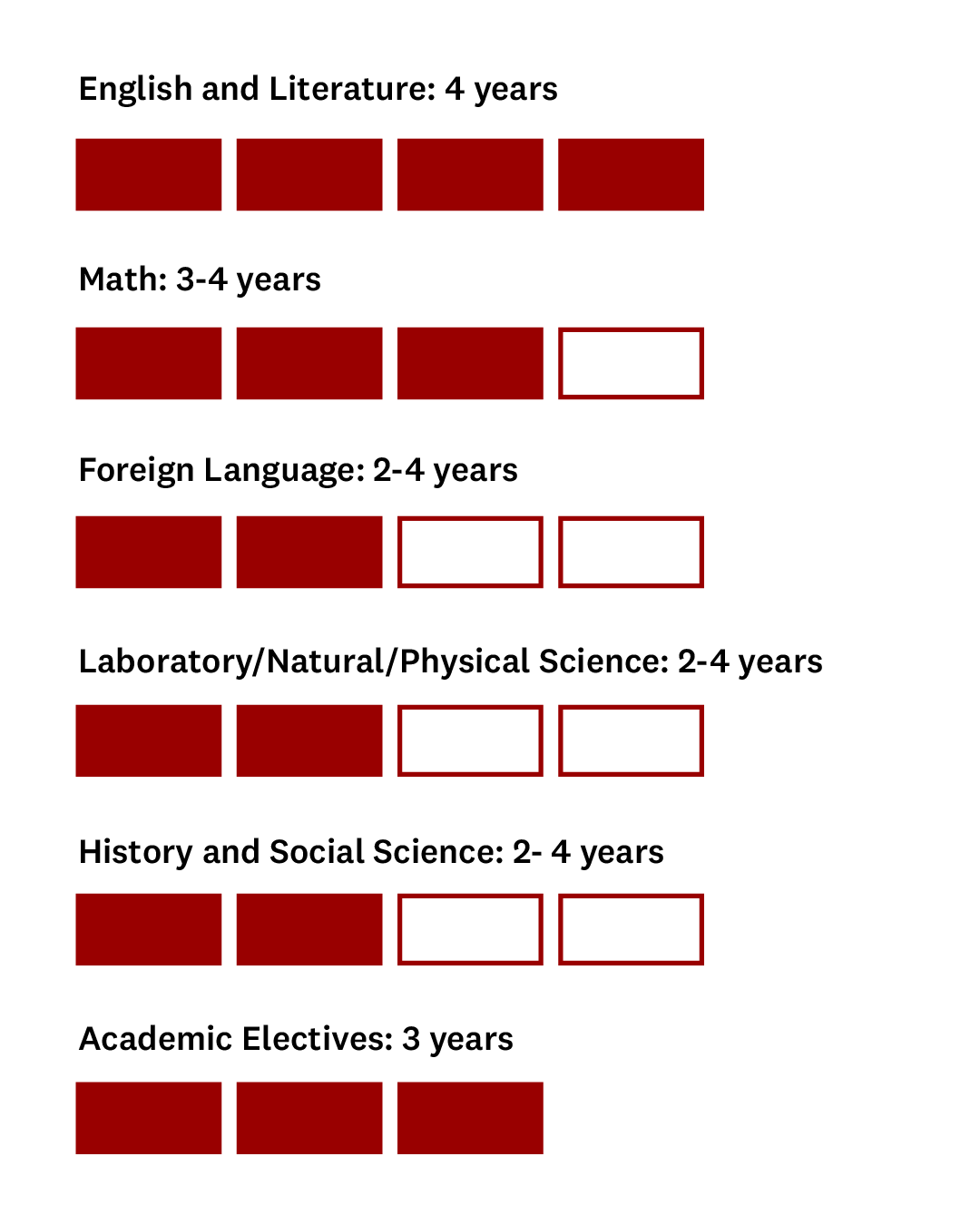Preparing for College
Preparing for College
A college education can prepare you for the career of your dreams, help you learn about the world and other cultures, and open up opportunities that may not be available to you otherwise.
The following information will introduce you to the college admission process and the steps you can take as a high school student, no matter what grade you’re in, to prepare.

“If I could go back and tell the younger version of myself anything, it would be to remember that the admission process is not just about numbers or statistics; it's about showcasing who you are as an individual. By embracing your unique experiences, asking for help when needed and maintaining confidence in your abilities, you can navigate this process with greater ease.”
Planning by Grade Level
In high school, your preparation for college will begin in earnest. Colleges will consider everything you do for the next four years.
-
Now is the time to meet with your counselor to plan your studies for the next four years. The information below can help you determine the courses and activities that would work best for you.
- Join clubs and organizations at your school and in your community to explore your extracurricular interests.
- Compile a file that includes awards; and keep track of your involvement in activities.
- Start strong by striving to earn good grades in your classes.
- Learn about the PSAT and PreACT.
-
It’s a big year. It’s time to start exploring your collegiate interests and step up your academic efforts.
- Take on a leadership role or major project in at least one extracurricular activity. Activities include a broad range of possibilities, including family responsibilities, a part-time job, an internship, etc.
- Explore academic interests you may want to pursue in college. Take advanced classes (such as honors classes) that are available to you in those subject areas.
- Take the PSAT or PreACT.
- Start building relationships with teachers, counselors and others who may write your letters of recommendation. USC requires only one letter of recommendation for most programs.
- Begin researching colleges. Visit the College Search tool on the College Board’s Big Future website. In addition, sign up for college and university mailing lists. You can also subscribe to USC’s Undergraduate Admission Blog for application tips and student stories.
-
This is when you’ll be exploring your options and searching for colleges that will be a good fit for you. It’s also the time to make sure your grades remain strong, since this is the year colleges will examine most closely.
- Pursue additional leadership roles or major projects in extracurricular activities. Activities include a broad range of possibilities, including family responsibilities, a part-time job, an internship, etc.
- Explore more deeply the academic interests you want to pursue in college, also known as majors and minors. Take advanced courses (such as Advanced Placement, International Baccalaureate, college-level) and additional classes that are available to you in those subject areas.
- Start working with your school counselor to create a preliminary college list. Visit as many schools as you can in person or take virtual tours. Attend information sessions offered by colleges or connect with admission representatives at a local college fair or high school visit.
- Study for and take any standardized tests required by colleges or universities to which you are applying. USC is test-optional.
- This is also a good time to start conversations with your family about paying for college.
-
The final year of high school is when you prepare for your college experience by applying to the colleges or universities you’ve researched, being formally admitted to one or more colleges, and enrolling at the institution of your choice.
- Continue to take on leadership roles or major projects in extracurricular activities. Activities include a broad range of possibilities, including family responsibilities, a part-time job, an internship, etc.
- Keep your grades up! Colleges may look at your mid-year report for admission. They will certainly look at your final grades before confirming your eligibility to enroll.
- Finalize your college list with your school counselor.
- Take additional on-campus or virtual tours, attend in-person or online events and information sessions, and reach out to your admission counselor with any questions. Note: USC does not track demonstrated interest, meaning your participation in activities or your contact with admission staff will not affect your admission.
- Compile any final standardized tests required by colleges or universities to which you are applying. USC is test-optional.
- Finish applications. Polish your college essay, ask for recommendation letters, etc., in time to submit them by the appropriate deadline. Some programs, such as arts majors, may also require auditions, portfolios, or other materials.
- Learn more about scholarships and financial aid. Ask your family for help submitting required financial aid application materials.
-
- Visit colleges. Even if classes aren’t in session, you can still get a good feel for the campus.
- Retake a class if you aren’t satisfied with the original grade you received.
- Take part in a summer academic enrichment program on a college campus, such as one of USC’s pre-college programs.
- Enroll in summer school to get ahead, or take a community college class.
- Volunteer or participate in summer activities, such as camp. Even serve in a leadership role.
- Save for college by working a part-time job.
- Don’t forget to have fun and relax, too!
Preparing Academically
You’ll want to work with your school counselor throughout high school to make sure you’re taking the classes you need for college, including your state’s public colleges, and to help keep you on track. Many colleges will look at ninth grade through the end of your first semester/trimester of twelfth grade. You’ll want to strive to earn as many A’s as possible, and to take advantage of advanced (such as honors, Advanced Placement, International Baccalaureate, college-level) classes available to you. USC admission counselors understand your school’s grading system and what classes your school offers, so they can consider your academic preparation in that context.
Students should complete a college preparatory schedule that includes:

Note: At minimum, USC applicants are expected to have earned a grade of C or better in at least three years of high school mathematics, including Advanced Algebra (Algebra II).
To prepare for colleges and universities with highly selective admission, like USC, we recommend that you go beyond the minimum. For example, take extra classes in the subjects in which you excel or that are related to the area you want to study in college. If you plan to apply to an Engineering program, you’ll want to show especially strong preparation in science and math. Likewise, if you are thinking about pursuing a major in the social sciences, you might consider taking additional history and social science classes. We also recommend that you take rigorous classes that may help you earn college credit, such as Advanced Placement or International Baccalaureate classes, if your high school offers them. Your local community college may also offer classes that you can take while in high school to earn college credit
In general, you’ll want to take classes that will challenge you and best prepare you for a rigorous university course load. While you want to take the most demanding schedule you can handle, you don’t want to become overwhelmed. Your school counselor can help you plan your classes based on your strengths and interests. And, if things get tough, talk with your support system, including your school counselor, teachers and family members.
Standardized tests, such as the SAT and ACT, may be a part of your preparation for college applications. USC is test-optional ,and testing policies will vary by institution. We recommend looking into the testing policies for the different schools you are interested in. You can learn more about the SAT on the College Board site, and more about the ACT on their website.
Saving for College
It’s important to have an honest conversation with your family about paying for college prior to making your college decision. You should not be dissuaded from applying to a school based solely upon its cost of attendance, because need-based financial aid and/or merit-based scholarships can significantly lower your family’s out-of-pocket costs. Also keep in mind that if applying presents a financial burden, many schools (including USC) offer application fee waivers.
The most common document you will need to submit to apply for financial aid is the Free Application for Federal Student Aid, or FAFSA. Some institutions, including USC, require the CSS Profile to be submitted as well. These documents are available starting October 1 of each year. Deadlines will differ by institution and application cycle. You can learn more about applying for need-based financial aid at USC on our How to Apply page.
Learn more about saving for college.
Keep These Key Points in Mind
Private colleges can be affordable.
With need-based financial aid and merit scholarships, students may find that a private university is an affordable option. For example, over two-thirds of USC students receive some form of aid. This is why you should not base your college preferences solely on those schools’ cost of attendance.
There’s not one “perfect” college for you.
There are many fantastic colleges out there. You’ll find that more than one college can meet your criteria. Visit the College Search tool of the College Board’s Big Future website for information about thousands of schools.
Admission counselors consider more than just grades and test scores.
Many schools, including USC, take a holistic approach to admission decisions, meaning that they try to understand you not just as a student, but as a person. In addition to your academic record, counselors weigh qualities such as leadership, potential, talent and personal characteristics as exemplified throughout the different parts of your application. Ultimately, colleges want to see how you might contribute to their communities.
Colleges don’t necessarily prefer certain extracurricular activities over others.
Being in a formal club or organization is just as valuable as doing community service, working a part-time job or having significant family commitments. Counselors are looking for your level of commitment outside the classroom in whatever activities you choose.
Context matters.
Counselors consider the context of each application. This includes understanding what is offered at individual high schools, whether there are any personal circumstances that have affected a student, etc.
Visit Campus
There is no better way to learn about a university than to tour it. USC offers a variety of on-campus tour options for individuals and groups. You can also take advantage of our self-guided tour or an immersive online tour. These different options allow you to explore campus at your own pace—or even from the comfort of your own home! Tours introduce visitors to the USC campus, highlighting our history, traditions, academic programs and student life.
Take Advantage of These Resources
Download USC Publications
Explore all that USC has to offer, from academics to campus activities to athletics, and learn more about our admission and financial aid processes.
Meet USC
Introduction to USC
Investing in Your Future
Stay Up to Date
Receive updates about all things USC by signing up for our mailing list. This will also ensure that you receive timely updates from the Offices of Admission and Financial Aid.
Subscribe to the USC Undergraduate Admission Blog
Subscribe to our blog for key insights into the admission process, student life and making your application to USC stand out.
Follow Us on Social Media
Follow us on YouTube, Instagram, Facebook and X and for important reminders and updates.
